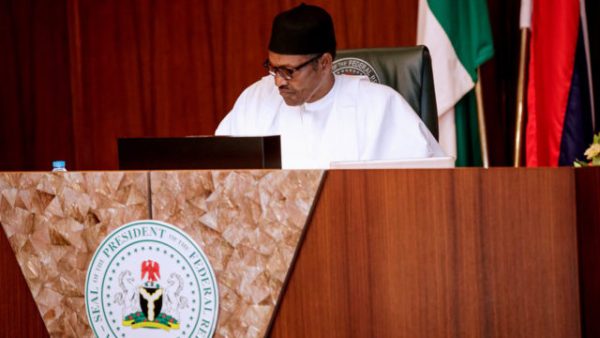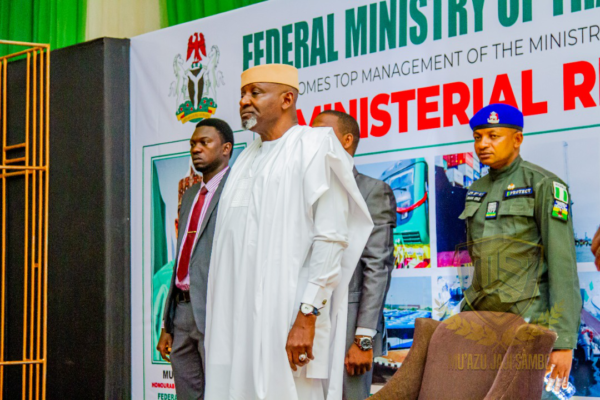FG bans forex for food importation

President Muhammadu Buhari, yesterday directed the Central Bank of Nigeria (CBN) to stop providing foreign exchange for importation of food into the country.
Buhari made the disclosure on Tuesday in Daura, Katsina State, when he hosted All Progressives Congress (APC) governors to the 2019 Eid-el-Kabir lunch at his country home.
According to him, the directive is to achieve steady improvement in agricultural production, and attainment of full food security.
In a statement, Senior Special Assistant on Media and Publicity, Garba Shehu, quoted Buhari as saying that the foreign reserve will be conserved and utilised strictly for diversification of the economy, and not to encourage more dependence on foreign food imports.
“Don’t give a cent to anybody to import food into the country,” he directed.
The President noted that some states like Kebbi, Ogun, Lagos, Jigawa, Ebonyi and Kano, had already taken advantage of the Federal Government’s policy on agriculture with their huge returns in rice farming, urging more states to key into the ongoing revolution to feed the nation.
“We have achieved food security, and for physical security we are not doing badly,” he said.
Buhari said he was particularly delighted that young Nigerians, including graduates, have started exploring agri-business and entrepreneurship, with many posting testimonies of good returns on their investments.
He said the incoming ministers will be “taught’’ and thoroughly guided to ensure they meet the targets of the APC-led government for the people, with regular monitoring of their performances and scaling up of targets by the Office of the Secretary to the Government of the Federation (OSGF).
The President promised to attend the Presidential Policy Retreat organised for the ministers by the OSFG, insisting on compliance with laid down targets on key sectors of the economy that would directly impact the livelihood of Nigerians.
In his remarks, the Chairman of the Nigerian Governors’ Forum and Governor of Ekiti State, Dr John Kayode Fayemi, said the President’s sense of justice, fairness and forthrightness had turned a major inspiration to governors on the way forward for the country.
He said the challenges faced by states “were enormous’’, but the governors had remained undaunted, assuring the Nigerian leader of strong support and “the very best effort’’ to overcome all remaining obstacles.
Similarly, Chairman of the Progressive Governors Forum and Governor of Kebbi State, Alhaji Atiku Bagudu, appreciated the President for the unique leadership style of maintaining a healthy relationship with governors on individual and collective basis, pointing out that they had been “energised’’ to do more in their states.
The governor commended the President for making bold and courageous efforts to reposition the economy for majority Nigerians through inclusive policies.
“The country is more secure than in 2015, and the country is more prosperous than in 2015 because you are working for the majority of the people,’’ he added.
The governor said the party had been repositioned, after the 2019 elections, to work for the benefit of the majority of Nigerians, noting that “there will be two elections this year and we need to work towards winning the two states.’’
Meanwhile, Nigerian economic experts have reacted to the planned foreign exchange ban on food import by President Buhari.
Professor Pat Utomi, a political economist lauded the President’s initiative, noting it held the prospect of boosting development of the local food industry and assisting government halt a possible slide into another economic recession. “I don’t have anything against it as it is important that there should always be a policy for local industrialisation,” said Utomi.
He, however, said because food production has been made more difficult in recent years by rising insecurity across the country as many people are unable to go to farms, the policy may lead to severe food shortages. He explained that any policy to curtail food imports should be weighed against the country’s comparative advantage, especially the capacity to produce such foods in sufficient quantity for the local market.
“The economy is already sliding into a tough strait with oil prices dropping and things are getting more difficult that we may have to borrow and continue to borrow. And if we are not careful, we may have balance of payment issues and slip into another recession,” he warned.
Also commenting on Buhari’s proposition, a foremost economist and Managing Director of Financial Derivatives Limited, Mr. Bismarck Rewane, said the forex ban was not a fundamental issue but mere cosmetic approach to economic problems.
He said similar bans in the past had failed to yield the expected result as some of the products still found their way into the country.
‘‘Is it not in this country that the Federal Government banned the importation of vehicles and rice? Are these products not still available in the country today?
Go to some of these retail stores, you still find imported rice in different variant and quantity displayed on shelves. So for me, these are not really serious issues that should be taken seriously.
Restrictions don’t really help economies while protectionism , to me is a Trump style, that does not , in any way , help economies, adding that to be successful is to realise what is possible.
Until you figure out your exchange rate policy in this country, smuggling will still be a byproduct of an inefficient exchange rate, adding that, there is nothing that can be done about it.
If it is cheaper for businessmen to import things, irrespective of weather there is a ban on forex or not, people will always find a way around smuggling. It is the Customs and smugglers that will benefit from such illicit act’’.
Rewane said if government blocks forex through the official source, businesses will find a way around it using black market and other sources to get it in order to smuggle the product into the country. The financial expert said the easiest thing to do is to announce regulation because talk is cheap, adding that, the most difficult thing to carry out is enforcement of the regulation.







